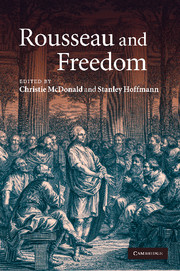Book contents
- Frontmatter
- Contents
- List of illustrations
- Notes on contributors
- Acknowledgments
- List of abbreviations
- Introduction
- PART I
- PART II
- 7 The Social Contract, or the mirage of the general will
- 8 “Par le bon usage de ma liberté”: freedom and Rousseau's reconstituted Christianity
- 9 The constraints of liberty at the scene of instruction
- 10 “Toutes mes idées sont en images”: Rousseau and the yoke of necessity
- 11 Rousseau's ruins
- 12 Can woman be free?
- 13 The subject and its body: love of oneself and freedom in the thought of Rousseau
- PART III
- Bibliography
- Index
12 - Can woman be free?
Published online by Cambridge University Press: 05 May 2010
- Frontmatter
- Contents
- List of illustrations
- Notes on contributors
- Acknowledgments
- List of abbreviations
- Introduction
- PART I
- PART II
- 7 The Social Contract, or the mirage of the general will
- 8 “Par le bon usage de ma liberté”: freedom and Rousseau's reconstituted Christianity
- 9 The constraints of liberty at the scene of instruction
- 10 “Toutes mes idées sont en images”: Rousseau and the yoke of necessity
- 11 Rousseau's ruins
- 12 Can woman be free?
- 13 The subject and its body: love of oneself and freedom in the thought of Rousseau
- PART III
- Bibliography
- Index
Summary
That Rousseau was no friend of women (and even less of feminists) has long been the conclusion of many of his readers; those of Emile in particular. I am not proposing to deny this, but to approach the question of whether woman can be free in a different way, beginning, by way of counterpoint, with a quotation of a different tenor from a lawgiver who appears to differ quite dramatically from Rousseau:
I instituted the order that seemed to me the simplest to observe, and the most likely to be long lasting. In each family, I decreed that the eldest would be considered as its head, unless he was unable to hold that rank for some substantial reason, the determination of which would fall to a high tribunal. The order of birth was similarly to determine all the other ranks. I did not think it proper to exclude women from the rights I granted to men. Nature gives them the same claim as it gives to us; and if the principal foundation of authority over children is the benefit of birth and education, it seems that a mother should have the larger share of it, having such an investment in those two benefits. I therefore ordered by an irrevocable law that power and authority would be according to age, without distinction of sex.
As for participation in the governing communal body, the role of women here is limited in function only during their childbearing and childrearing years, and for this reason only, men may become members of society at forty, but women not until fifty:
I saw no other reason why they should be less capable than us at that age of the tasks of government, I wanted them to have as great a role as the men. […]
- Type
- Chapter
- Information
- Rousseau and Freedom , pp. 207 - 215Publisher: Cambridge University PressPrint publication year: 2010



